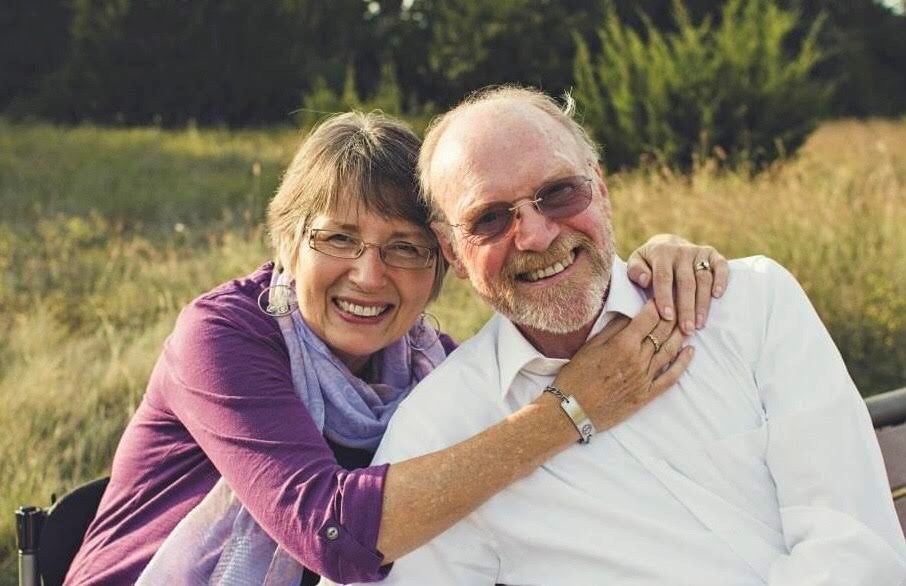I Encourage You to Press On!
March 27, 2023
By: Beverly Moody
Categories: Neurosciences (Brain Spine, Nerves), Women's Health
Cathy Campbell was bicycling near a deep culvert when she lost control, crashed her bike, and landed on hard, unforgiving granite. Her spinal cord was severely injured. Cathy was given devastating news: she would be paraplegic — living without use of her legs.
A woman of faith, Cathy turned to Ken, her loving husband of 38 years and said, “God has us on a different path for our retirement.”
Sixteen years later, Cathy actively lives her life with a view from her wheelchair. One morning, while getting out of bed, Cathy slipped using the transfer board and landed on the side of her wheelchair. Initially, the couple thought it was only a surface bruise. But then the wound festered and deepened — almost reaching the bone.
At the time of the wheelchair accident, the couple was living in Texas, so Cathy began her wound care treatment there, using a wound vacuum system. When she and Ken moved to Michigan, Cathy’s care was seamlessly transferred to Trinity Health Wound Care in Grand Rapids.
“These wounds are potentially very severe in patients with paraplegia as they can develop and can deteriorate rapidly if not managed quickly. When I saw Cathy, she had a stage 3 pressure sore and had started treatment prior to her moving from Texas,” said Emily Sparks, PA-C, a member of Cathy’s care team at Trinity Health Wound Care.
A pressure ulcer is essentially a deep tissue injury caused from pressure. The staging indicates it had caused injury to those tissues.
“Pressure sores are staged 1-4, stage 4 may involve deeper structures, including bone. So, a stage 3 is severe and involves full thickness skin loss – the damage extends below all layers of the skin, into deeper tissues including the fat layer,” Emily added.
The Campbells used a wound vacuum for six months. “At a certain point, the Trinity Health Wound Care team said the vacuum wouldn’t work anymore, so they taught Ken how to care for the wound. He cleaned it every morning with the ‘wet to dry’ system,” said Cathy.
Cathy’s Trinity Health Wound Care team tracked her progress – celebrating Cathy’s advances and helping her manage the struggles. “My prognosis was ‘poor to fair, to good to poor’. I occasionally felt periods of darkness, and I shared this with my doctor. He noticed the depression,” said Cathy. “We’re not perfect people, we occasionally need help from each other.” Cathy’s depression was treated with medication.
Cathy, Ken, and her care team worked on her wound for a year and a half. Her care occurred during the COVID-19 pandemic and lockdown time in Michigan. This compounded the isolation and depression Cathy and Ken felt.
Ken was candid about his struggles as a caregiver. “I chose not to think about the care I had to give tomorrow; I focused on the care I was giving in the moment. If caregivers focus on everything they have to do, it can feel overwhelming. I recommend thinking about it in little bits. Also, find opportunities for respite. Since Cathy is quite independent during the day, I was able to do shopping, go to the mall for a walk, work in the garden, otherwise keep busy," Ken said.
Cathy has advice for people facing extended care periods, like hers. “Be obedient to what the doctor says. Don’t cancel appointments. I encourage you to press on! Do things you enjoy and are able to do. Talk to your doctor about depression if you need to and do what you can to serve others. You’ll be blessed more than the people you serve. And pray,” said Cathy.
Thanks to Trinity Health Wound Care and Ken’s diligent attention, the wound finally healed —after 18 months. “I felt a great deal of support from Cathy’s Trinity Health care team. There was a mutual effort to work together,” said Ken.
“In Cathy’s case, I'd credit healing to the dedication to offloading (taking pressure off the wound), nutritional health, and the diligence on management of the wound by John Morris, DO, (Cathy’s physician), Cathy’s family, Cathy, and the care team at Wound Care,” said Emily.
“I’m busy again! We moved to an independent living facility. I’m involved in the church, and life is so satisfying!” said Cathy.
To learn more, visit Trinity Health Wound Care.




